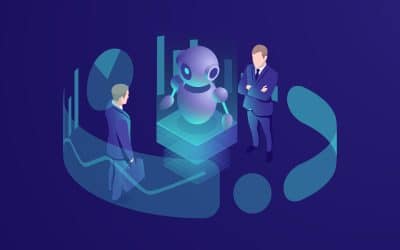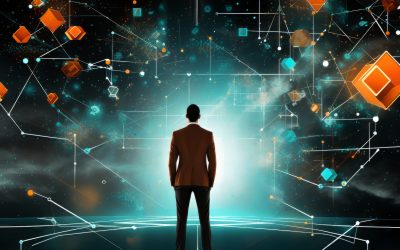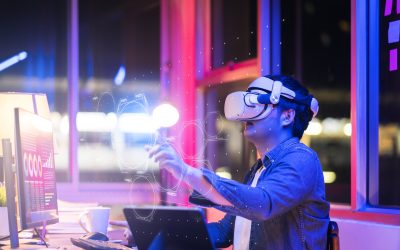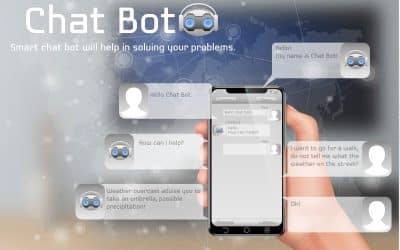Artificial Intelligence solutions rapidly emerge as a disruptive force across diverse industries, drastically altering conventional methods and speeding up innovations. Using sophisticated algorithms, machine learning methods, and massive datasets, AI is revolutionizing how businesses interact with customers and make critical decisions. This technological revolution isn’t limited to one particular industry but spans various industries, from manufacturing to healthcare to finance, retail, and more.
AI’s promise lies in its capacity to automate routine tasks, extract crucial insights from data, and increase efficiency and productivity at a never-before-seen rate. Companies embracing custom AI solutions can open up new opportunities for growth while creating cost savings and increasing their competitiveness in the global marketplace.
However, these advancements have ethical questions and concerns that must be addressed to ensure responsible AI deployment. In this report, we examine how AI is changing industries’ operations and altering the future of work and society.
Augmented Reality (AR) and Virtual Reality (VR) with AI
Augmented Reality (AR) and Virtual Reality (VR) are quickly evolving technologies that are continuously being enhanced and improved with the aid of Artificial Intelligence (AI). AI algorithms are used to personalize AR and VR experiences to make them more enjoyable, interactive, and flexible to user input.
One of the primary applications AI can serve in AR and VR is the production of rendering and content. AI algorithms can examine the real-world environment and the user’s interaction in real-time, enabling AR and VR devices to build dynamic, real-time virtual environments and objects that react to movements and gestures.
Furthermore, AI is enhancing the real-time interaction and immersion inherent to AR and VR by using neural technology to process languages (NLP) and speech recognition technologies. By analyzing the patterns of speech and context, AI algorithms are able to recognize and respond to inquiries as well as commands, creating the most natural and intuitive interaction possible in AR and VR environments.
Additionally, AI-powered recommendation engines provide customized AR or VR-based experiences and content based on user’s preferences and behavior. By analyzing user data with satisfaction and engagement measures, AI algorithms can suggest content and experiences tailored to every user’s needs and interests, increasing engagement and satisfaction.
Additionally, AI-driven object detection and tracking technology is enhancing the efficiency and quality of AR and VR applications. By analyzing the information gathered from cameras and sensors, AI algorithms can identify and track objects in the user’s surroundings, which allows for more precise movement of virtual objects and their interaction in AR and VR scenes.
The application of AI in AR and VR is ultimately leading to significant advancements in immersive technology. It’s changing the way people interact with the digital world and experience. As technology advances, it will provide new opportunities to be creative and innovative in entertainment, education, and other fields.
AI in Finance: Algorithmic Trading and Risk Management
The financial sector is transforming due to the application of AI (AI) technology, which is changing how banks manage risks, make investment decisions and provide financial services. By using AI algorithms and machine learning techniques, financial experts are able to analyze vast amounts of data, detect patterns, and make the best decisions based on the information in real-time. This is improving transparency, profitability, and efficiency within the realm of finance.
One of the primary applications AI can be used to solve problems is in finance. It facilitates algorithmic trading. AI-powered trading algorithms can analyze market data, spot trading opportunities, and trade faster and with greater precision than human traders and financial institutions, allowing them to gain from market inefficiencies and generate alpha.
In addition, AI is revolutionizing risk management by utilizing predictive analysis and modeling scenarios. By analyzing historical data, macroeconomic indicators, and market trend indicators, AI software can analyze and quantify risk across various types of assets and portfolios. It also assists financial institutions in identifying potential weaknesses and developing proactive strategies to manage risk.
Furthermore, AI-driven fraud detection and anti-money laundering (AML) technology are enhancing security and compliance within the financial sector. By analyzing transaction data and identifying abnormal patterns, AI algorithms can identify potential fraud or even money laundering in real-time, which can help financial institutions minimize risks and guard against criminals in the financial sector.
Furthermore, AI-powered customer support and personalization are changing the way financial services are provided and consumed. Virtual assistants, chatbots, and other virtual agents can provide personalized advice, respond to queries, and facilitate transactions, allowing financial institutions to offer smooth and efficient customer service and cut operational costs.
Overall, the application of AI in finance is bringing considerable improvements in risk management, trading, and customer service. It is changing how financial services are offered and consumed in this digital age. Banks continue to adopt AI technology; they are poised to discover new avenues to develop and innovate that will create a more robust and inclusive banking system available to all.
Transforming healthcare through the use of AI Diagnostics
The advent of AI development in the healthcare industry has brought an exciting new era in diagnosis, treatment, and patient care. From the analysis of medical images to personalized treatment recommendations, AI is revolutionizing various aspects of healthcare delivery with unimaginable levels of precision and efficiency.
One of the most significant technological advancements made possible by AI is the analysis of images from medical facilities. AI algorithms based on massive databases can analyze radiological images like MRIs, X-rays, and CT scans with remarkable precision, aiding doctors in identifying anomalies and diagnosing health issues at the beginning stages. This aids in speeding diagnosis and helps improve outcomes by rapid intervention.
Additionally, AI-driven predictive analysis transforms healthcare by anticipating the development of disease, identifying high-risk patients, and enhancing treatments. By analyzing EHRs (EHRs) and other patient data, AI systems can stratify groups of patients according to their likelihood of developing specific conditions, allowing healthcare professionals to allocate resources better and tailor interventions to meet the needs of particular patients.
Additionally, AI-powered chatbots and health assistants could improve patients’ engagement and make it easier to access medical services. These systems are smart enough to detect ailments, offer medical advice, and even set appointments, thereby lessening the workload on healthcare professionals and increasing accessibility to healthcare.
The application of AI within healthcare holds a vast potential to increase diagnostic accuracy, improve patient outcomes, and increase efficiency across the entire healthcare system. As AI grows and improves, its effects on healthcare delivery are expected to be huge and will bring about a time of precision medicine and customized healthcare.
Enhancing the Customer Experience with AI in Retail
In the retail sector, AI has changed the way customers shop, allowing for personalization and enhancing the efficiency of operations. From virtual assistants to recommendation engines, AI-powered solutions have changed how retailers interact with customers and give the best value across multiple ways of interaction.
One of the primary ways that AI can be used for Artificial intelligence development in the retail industry is by personalizing suggestions. By analyzing information about customers, including purchases or purchase history, as well as browsing patterns, AI algorithms can predict the preferences of each customer and then tailor recommendations to satisfy the particular needs of every customer’s personal preferences and preferences, thus improving the shopping experience while growing sales.
In addition, AI-driven chatbots and virtual assistants are revolutionizing customer service and support in the retail industry. These AI-driven systems can assist customers with their queries, offer information about the product, and assist with transactions, thereby reducing the workload of human service workers and increasing overall efficiency.
Additionally, AI is optimizing inventory management and supply chain operations within the retail sector. By anticipating demand, forecasting trends, and improving the quantity of stock taken, AI systems can help retailers reduce inventory shortages, decrease overstocking, and improve the turnover rate of their inventory, thereby increasing profits and decreasing losses.
Furthermore, AI-powered searching technology is helping improve the shopping experience online by allowing shoppers to search for items using images rather than text. This simplifies the process and allows shoppers to find products that fit their needs faster and more precisely.
In the end, integrating AI in retail operations significantly enhances customer experience, performance, and efficiency. When retailers harness the power of AI, they can expect to create new opportunities for growth and innovation in a data-driven and digital world.
AI-Driven Agriculture: Precision Farming
In the area of farming, custom AI development technology has transformed traditional practices, leading to the efficiency of food production and sustainability. With the aid of AI-powered technologies, farmers will be capable of making informed decisions, optimizing the distribution of their resources, and lessening environmental impact, thus transforming the future of agriculture.
One of the main applications AI can serve is helping farmers in precision farming. By analyzing the data gathered by drones or sensors as well as satellite images, AI systems can provide farmers with information on the condition of soils, crop growth, and pests and allow farmers to adjust their farming practices to increase yields without the need for any inputs.
Furthermore, AI-driven predictive analysis has transformed the way we manage crops and has helped detect diseases that affect agriculture. By analyzing historic data and environmental conditions, AI algorithms can forecast crop diseases and pest outbreaks with greater accuracy, allowing farmers to adopt preventive measures to minimize crop losses.
Furthermore, AI is optimizing irrigation systems and water management for agriculture. By monitoring soil conditions and moisture levels in real-time, AI can automate irrigation scheduling and improve water utilization, which translates into conserving water resources and decreasing environmental impact.
Additionally, robots powered by AI or automation are revolutionizing labor-intensive jobs such as harvesting and plant and weed control in the agricultural sector. By using autonomous vehicles and robots, farmers can increase efficiency, reduce labor costs, and improve overall efficiency.
In the end, using AI in agriculture has tremendous potential to tackle problems of food security, sustainability, and environmental sustainability. When farmers implement AI-powered technologies, they will be able to revolutionize the process of producing food, which will create the most resilient, long-term sustainable future and ensure the safety of generations to come.
Smart Cities: AI for Urban Management
Smart cities are growing rapidly and becoming increasingly popular as cities search for innovative ways to address the complicated problems of urbanization, sustainable development, and resource management. The main reason for this shift is the integration of AI (AI) technologies, which has revolutionized urban management and improved the quality of life for inhabitants.
One of the primary applications for AI to assist smart city projects is traffic control and optimization. By analyzing real-time information about traffic taken from sensors, cameras, and GPS tools, AI algorithms can optimize traffic flow, decrease congestion, and decrease commute times, which in turn improves the quality of air and the mobility of urban areas.
Additionally, custom AI solutions enhance public security in smart cities by applying predictive analytics and surveillance systems. By studying irregularities and patterns evident in criminal statistics, AI algorithms can identify areas of high risk and determine the likelihood of events. This allows police departments to use resources more effectively and stop crimes before they happen.
Furthermore, AI-powered systems to manage energy are increasing energy consumption while reducing carbon dioxide emissions in smart cities. By studying energy use patterns and forecasts of weather conditions, AI algorithms can optimize the efficiency of energy grids, decrease peak demand, and encourage integration into renewable energy sources, which can increase resilience and sustainability.
In addition, AI-driven smart infrastructure technologies are increasing the reliability and effectiveness of the delivery of public services in intelligent cities. From water management to waste distribution, city planning, and emergency intervention, AI technology is enabling cities to allocate resources better, improve services, and be more responsive to the demands of their residents.
Overall, the inclusion of AI in smart urban areas accelerates the growth in sustainability, creativity, and resilience, turning urban areas into more livable, accessible, efficient, and inclusive zones. In the coming years, cities will benefit from the power of AI. They’re poised to take on modernization issues and offer everyone a better future.
AI-Powered Automation in Manufacturing
In manufacturing, AI-powered technology is revolutionizing processes, increasing efficiency, and increasing productivity. Traditional manufacturing processes usually include repetitive tasks prone to human error and inefficiency. However, with the advent of AI, manufacturing processes are shifting towards intelligent and automated decision-making. Together with robotics and IoT gadgets, AI algorithms can streamline manufacturing lines, reducing completion time and improving overall efficiency.
One important use of AI in manufacturing is predictive maintenance. By analyzing the information from sensors in real time, AI systems can predict equipment failures before they occur, enabling proactive maintenance and reducing costly downtime. In addition, AI-driven quality control systems can detect flaws more accurately and with the same accuracy as human inspectors, guaranteeing the product’s accuracy and reducing the risk of losses.
Furthermore, AI is optimizing supply chain management for manufacturing by forecasting demand, improving the amount of inventory available, and improving the efficiency of logistics processes. Machine learning algorithms allow manufacturers to analyze the past, market trends, and external influences to make educated choices that result in cost reductions and improved customer satisfaction.
In the final analysis, AI-powered automation is altering the way that manufacturing is done through the development of flexible, efficient manufacturing methods. As businesses embrace these new technologies, they gain an edge in the global marketplace, driving innovation and accelerating the pace of digital transformation.
The Future of Education is Adaptive Learning
The field of education is undergoing a revolutionary transformation due to the advent of technology such as AI, particularly in adaptive learning. By using AI algorithms and personalized learning platforms, teachers can modify their teaching to meet the needs and learning preferences of every pupil, which is transforming the method by which learning is taught and acquired.
One of the primary applications of AI in education is the creation of customized learning systems. Based on the analysis of information about students’ behavior, engagement, and preferences in education, AI algorithms can generate individual learning paths and ideas that enable students to study according to their own individual needs and focus on areas where they require the greatest assistance. This adaptive approach to learning increases students’ involvement, motivation, and academic success.
Furthermore, AI enhances assessment and feedback in education by automating grading and real-time analysis. By analyzing student responses to homework, quizzes, and tests, AI technology can provide immediate feedback and information to teachers and students, allowing for quick interventions and changes in the syllabus.
Additionally, AI-powered virtual tutors and educational assistants provide greater assistance and resources for students who are not in school. Intelligent technology can answer questions, explain things, and offer personalized recommendations that could help students expand their knowledge beyond traditional classes and foster continuous learning.
Additionally, AI is revolutionizing educational production and content delivery through interactive simulators, adaptable textbooks, and interactive learning environments. By utilizing AI algorithms and multimedia technology, educators can develop innovative, interactivity-based learning tools that cater to a variety of learning styles and preferences and improve the effectiveness of teaching.
In the end, the use of AI in education has enormous potential to create personal learning experiences, improve academic performance, and help students prepare to be successful in the new workplace. When educators work to benefit from the potential of AI and machine learning, they are in a position to change how knowledge is passed on, collected, and applied in classrooms worldwide.
AI in Energy: Optimization and Sustainability
The energy industry is undergoing massive changes due to the advent of new technologies like AI (AI) technologies, specifically in the fields of sustainability, optimization, and efficiency. Utilizing AI algorithms and sophisticated analytics, companies operating within the energy sector can enhance resource utilization, increase efficiency in operations, and accelerate the shift to sustainable energy resources, improving sustainability and adaptability to climate-related changes.
One of the primary applications of AI in the energy sector is predictive maintenance and asset management. By analyzing information collected from sensors and IoT devices, as well as older maintenance records, AI systems can detect the potential for equipment failures before their occurrence. This allows proactive maintenance, thus reducing downtime. This not only improves the reliability and efficiency of the infrastructure that provides energy, but it also reduces the expense of maintenance and extends the life of the equipment.
Additionally, custom AI development optimizes energy production and distribution by using the ability to predict demand and analyze it in a predictive manner. By analyzing forecasts for weather patterns, market trends, and consumer behavior, AI algorithms can anticipate changes in energy demand and adapt production and distribution in line with changing needs, ensuring a constant and reliable energy supply for the consumer.
In addition, AI-powered smart grids are transforming the way electricity is generated and consumed. By integrating AI algorithms in conjunction with IoT equipment and sources of renewable electricity, smart grids can improve energy flow, manage supply and demand in real-time, and optimize the use of renewable sources of energy, lowering carbon emissions while encouraging sustainable development.
Additionally, AI is driving innovation in the areas of grid resilience and energy storage, using sophisticated control and optimization algorithms. By enhancing the operation of energy storage systems and the coordination of responses across the grid to disruptions, AI technology could increase grid reliability, resilience, and resiliency in case of extreme weather and other challenges.
Ultimately, the advent of AI in the energy sector has led to substantial improvement in sustainability, efficiency, and resilience. This has changed the way energy is generated, distributed, and consumed. Energy companies are constantly trying to make use of AI’s potential. They can accelerate the transition to an environmentally friendly, sustainable energy future to ensure a fair and reliable energy system for future generations.
AI-Driven Personalized Marketing Strategies
In the age of digital marketing, Artificial Intelligence (AI) is changing how businesses interact with their clients and driving growth with specific marketing tactics. By using AI algorithms and analytics based on big data, marketers can analyze massive amounts of information about customers and determine individual preferences. They can then send specific offers and messages, increasing customer satisfaction, loyalty, and conversion rates.
One of the most important applications that AI can utilize in marketing is predictive analytics and customer segmentation. By analyzing past data on customer behavior, purchases, and customer demographics, AI algorithms can identify patterns and trends, categorize clients into different categories, and predict their behavior and preferences in the future. This makes it possible for marketers to personalize their marketing strategies and messages depending on each person’s personal preferences and requirements.
Furthermore, Artificial Intelligence-powered recommendation engines are transforming retail and e-commerce by providing customized product recommendations to shoppers based on their shopping habits and previous purchases. Based on information from prior interactions and personal preference, AI algorithms can suggest relevant products and offers to consumers at a moment’s notice, increasing cross-selling, opportunities for upselling, and revenues.
Furthermore, AI chatbot development can improve customer experience and engagement through many contact channels. They can respond to routine inquiries, provide personalized suggestions, and make transactions easier, increasing customer satisfaction and decreasing the load on human support agents.
Furthermore, AI optimizes advertising campaigns and buying media through real-time bidding and optimization methods. By analyzing data about advertising performance, audience demographics, and market trends, AI systems can help assign advertising budgets more efficiently and enhance the parameters of targeting, which can increase returns on investments (ROI) and enhance the efficiency and effectiveness of advertising campaigns.
The application of AI in marketing is leading to significant improvements in targeting personalization and customer engagement, which are changing how companies interact with their customers and accelerating growth in a constantly evolving market. As marketers try to harness the power of AI, they’ll be able to develop new opportunities to differentiate and innovate by providing more personalized and relevant experiences that their consumers can enjoy across any channel or communication point.
AI in Entertainment: Content Creation and Recommendation
The entertainment industry is experiencing significant changes due to the advancement of technology, such as artificial intelligence (AI) technology, particularly in media production and recommendation. With the help of AI algorithms and massive data analytics, makers and distributors can determine the preferences of their customers as well as forecast trends, and create personalized experiences, improving engagement and increasing expansion in the entertainment market.
One of AI’s most important applications for entertainment involves producing and creating content. By analyzing data on viewers’ preferences, viewing habits, and content performance, AI algorithms generate insights that help guide the creation process and allow content creators to create more engaging and captivating tales, characters, and experiences that are a hit with the viewers they are targeting.
Additionally, artificial intelligence-powered recommendation engines are revolutionizing how content is discovered and consumed on various platforms. By analyzing users’ interactions with their online browsing history and information about their social graphs, AI algorithms can suggest specific suggestions to users, assisting them in finding new content that is in the same style as their interests and preferences. This can increase the amount of time spent and retention.
Furthermore, AI is driving innovation in the distribution and monetization of content through the use of specific advertising strategies and dynamic pricing. AI technology can improve the positioning of advertisements, ad targeting, and pricing by analyzing an audience’s demographics and behavior and performance metrics to measure interaction. This, in turn, improves profits for content creators and distributors and the overall experience for consumers.
In addition, AI-driven influencers and digital avatars can blur the boundaries between the real and the fictional and interact with viewers in new and exciting ways. Virtual avatars can communicate with their followers as they create content and even endorse products and brands, providing new opportunities for content creators and marketers to engage with their audience and earn revenue through their content.
The application of AI in entertainment has led to significant advancements in content production, monetization, and recommendations, which have changed the way content is made and distributed in this age of digital. As technology continues to grow, develop, and expand, its impact on the entertainment industry is expected to be huge. It will open new avenues for innovative ideas, new ways of thinking, and involvement in the coming years.
Enhancing Supply Chain Management through AI
Supply chain management undergoes fundamental changes because of the integration technology based on AI (AI) technology, which is changing the method by which goods are procured, manufactured, and distributed through global supply chains. By utilizing AI algorithmic algorithms and advanced analytical methods, supply chain managers can improve the quantity of inventory, streamline logistics processes, and reduce risk, thereby increasing efficiency, resiliency, and profits.
One of the primary uses AI can benefit from to control supply chains is forecasting demand and optimizing inventory. Based on the analysis of historical data on sales, market trends, and external factors such as weather patterns and economic indicators, AI algorithms can generate precise demand forecasts and recommend the most effective inventory levels. This helps businesses limit the number of inventory items out of stock, reduce the expense of carrying them, and improve customer experience.
Additionally, AI is enhancing supply chain transparency and visibility by implementing continuous monitoring, tracking, and real-time tools. By integrating data created by sensors, RFID tags, and other IoT devices, AI solutions can offer full transparency of the movement of goods across the supply chain, enabling companies to identify obstructions, prevent disruptions, and optimize the delivery route in real time.
Furthermore, AI-driven predictive analysis has revolutionized managing risks within supply chain processes. By analyzing information about suppliers’ efficiency, geopolitical risks, and market fluctuations, AI algorithms can spot potential weaknesses and risks in a supply chain, allowing companies to develop proactive strategies to reduce risk and ensure business continuity.
Furthermore, AI-powered robots and automation are revolutionizing fulfillment and warehousing procedures, increasing efficiency while decreasing labor costs. With the aid of robotic arms, autonomous vehicles, and automated picking systems, companies can speed up their order fulfillment processes, lower the possibility of mistakes, and improve the efficiency of their methods, improving the effectiveness and efficiency of the supply chain.
In the end, using AI to control supply chains has led to substantial improvements in efficiency, transparency, and resiliency, altering the ways in which products are procured, made, and delivered globally. When companies are able to tap the power of AI and machine learning, they have the potential to create new opportunities for innovation and expand logistics operations.
AI in Financial Services: Predictive Analytics
The financial services field is experiencing a dramatic transformation triggered by the advancement of technologies such as artificial intelligence, particularly in prescriptive analytics. By utilizing advanced machine learning algorithms and vast data-driven analysis, companies are able to uncover important insights, reduce risks, and make better-informed decisions across various fields.
One of the most important reasons for using AI in the financial industry is risk management. Artificial intelligence-powered models that are predictive analytics can assess the risk associated with credit risk, market risk, and operational risks with greater accuracy and precision than traditional methods, which allows institutions to identify and lessen the risk associated with their business.
Additionally, AI is revolutionizing fraud detection and prevention in finance. By analyzing patterns and anomalies in real-time transaction data, AI systems can detect fraud with high precision and help businesses fight financial crimes and safeguard their assets.
Additionally, chatbots powered by AI and virtual assistants have increased customer service and support in the financial industry. These AI-powered systems can answer routine questions, provide tailored suggestions, improve customer onboarding, and enhance customer satisfaction and engagement.
In the end, the use of AI in the banking sector has improved operational efficiency, increased capacity to manage risk, and made customer service more enjoyable. If banks keep implementing technologies powered by AI and machine learning, they can improve their competitive edge in an increasingly complex and dynamic market.
AI for Fraud Detection and Cybersecurity
In today’s digitally connected world, the possibility of cyber-attacks and fraud can create significant problems for companies across all sectors. However, AI technology is evolving into efficient tools to detect and reduce dangers, allowing companies to safeguard their assets, secure data, and build trust in their clients and partners.
One of the most important reasons to use AI to prevent fraud is to monitor transactions and detect suspicious transactions. By continuously analyzing massive volumes of transactional information, AI algorithms can identify patterns and irregularities that could indicate fraud. Businesses can detect and stop fraudulent transactions before they occur, reducing financial losses and reputational damage.
Additionally, AI is enhancing cybersecurity security by utilizing threat intelligence and behavioral analysis. By analyzing users’ user behavior, network traffic, and systems logs, AI systems can identify and respond to suspicious activity and security breaches that could be a threat in real-time, allowing organizations to combat cyber-attacks and avoid data breaches.
Furthermore, using artificial intelligence-powered systems for fraud prevention has changed authentication and identity verification procedures. By analyzing biometric information, such as patterns of behavior, behavioral patterns, and other historical details, AI algorithms can verify the person’s authenticity using high accuracy, allowing companies to secure their data from hackers’ access. Secure sensitive information from unauthorized access.
Additionally, AI-driven cybersecurity tools enable organizations to automatize identification and reaction to security threats. They also decrease the workload on security personnel and improve the efficiency of security-related operations. Utilizing AI algorithms and machine learning techniques can sift through massive amounts of security information, detect new threats, and respond in real-time, reducing the adverse effects of cyber-attacks and ensuring that business operations are uninterrupted.
The application of AI in security and fraud detection provides substantial improvements in preventing threats, crisis response, and risk reduction, enabling businesses to stay on top of new threats and protect their assets from a complex and constantly changing threat landscape. As companies continue to invest in AI-powered security and fraud detection, they’ll be able to improve their resilience while maintaining the trust of their clients and business partners in a technological world that is constantly evolving.
AI in Human Resources: Recruitment and HR Analytics
Human Resources (HR) management is experiencing radical changes due to the advent of new technologies like AI (AI) techniques that are changing the methods employers can attract, recruit, and manage employees. With the help of AI algorithms and algorithmic techniques along with advanced analytics, HR managers can streamline recruitment processes, locate the most attractive candidates, and develop methods to manage workers, improving employee efficiency, productivity, and satisfaction.
One of the primary applications of AI in HR is talent recruiting and acquisition. By analyzing resumes, social media profiles, and other information regarding the candidate, AI algorithms can identify skilled candidates, evaluate the likelihood that they will be successful in particular job roles, and suggest the most suitable candidates for jobs. This can help companies fill vacancies faster and with greater precision.
Furthermore, AI-driven technology to manage the talent pool transforms retention and development strategies. By analyzing information regarding performance assessment of skills and feedback from employees, AI algorithms can identify people with a high chance of success, recommend personalized growth opportunities, and determine the probability of leaving. This allows organizations to manage talent in a proactive manner and provide an environment that promotes continuous growth and learning.
Furthermore, AI-powered HR analytics solutions can help companies gain valuable information from their HR database, which allows strategic decision-making based on information. By studying population demographics, engagement metrics, and indicators of efficiency, AI algorithms can identify patterns, trends, and relationships that inform HR policies, practices, procedures, and processes. This enables companies to improve their methods of managing their employees’ human capital and ensure the success of their business.
In addition, chatbots powered by AI and virtual assistants are helping to increase customer service and support within HR. They will be able to answer questions, provide details, and assist with transactions related to benefits enrolment, time off requests, and HR policy, which is making HR employees’ lives easier and enhancing the user experience overall.
In the end, AI’s integration into HR operations has led to significant advances in talent management, recruitment, and workforce analytics, transforming the way that companies look for and train people in the digital age. In the coming years, HR specialists will continue to use AI’s potential. They’ll be able to bring new possibilities for efficiency and creativity to HR practices and processes.
AI-Powered Personal Assistants and Chatbots
Artificial Intelligence (AI) has transformed how companies and users interact with technology due to the development of personal assistants powered by artificial intelligence and chatbots. These intelligent systems are based on the natural process of language (NLP) together with machine learning to identify users’ needs, provide personal assistance, and automatize the process, which increases efficiency in productivity and user experience in various fields.
Siri, Alexa, and Google Assistant are the most common applications of AI-integrated chatbots with virtual assistants. Virtual assistants are able to perform numerous tasks like setting reminders, scheduling appointments and making them provide information about weather conditions, and also respond to inquiries. It lets users access information and complete tasks using simple voice commands without hands or effort.
AI-powered chatbots are changing the way support and customer service work across all sectors. AI-powered systems can handle simple questions, provide personalized recommendations, and even facilitate transactions, reducing the workload of human support agents and increasing the speed of response and customer satisfaction.
In addition, AI-powered personal assistants and chatbots are revolutionizing how people collaborate and work. Through their integration with productivity tools and corporate apps, these tools can help reduce routine tasks, streamline processes, and improve collaboration and communication between teams, allowing companies to boost the efficiency of their teams and increase productivity.
Additionally, AI-powered personal assistants and chatbots are increasing accessibility and inclusion of people with disabilities. AI-powered systems assist in tasks such as reading loudly or browsing websites, in addition to using digital interfaces, which allows people with motor or visual disabilities to gain access to information and services more quickly and with less difficulty.
Overall, the development of AI-powered assistants, such as chatbots, is providing huge improvements in efficiency, productivity, and satisfaction across many areas. As technology advances, intelligent machines will play a greater part in how companies and users interact with technology, which will open up new possibilities to improve efficiency and creativity in the digital age.
AI in Transportation: Autonomous Vehicles
The transport industry is set for revolution due to the advancement of artificial intelligence (AI) technology, especially in the area of autonomous vehicles. From self-driving vehicles to autonomous drones, AI technology is changing the way people and goods move and bringing unprecedented levels of security, efficiency, comfort, and effectiveness.
One of the most significant advances AI brought about in transportation has been the development of autonomous vehicles. By combining sensors, cameras, and AI algorithms, autonomous cars can perceive the surrounding environment, navigate challenging situations in traffic, and make quick decisions that guarantee the safety and efficiency of transport. This technology will alter how people travel around, reduce congestion on roads, and lessen the environmental impact of transport.
In addition, AI is optimizing logistics and supply chain processes through predictive analysis and route optimization. By analyzing data on transportation routes, traffic patterns, and weather conditions, AI algorithms can determine the best routes, reduce the time to delivery, increase the quantity of energy required, and improve the efficiency of the entire transportation network.
Additionally, automated traffic management systems enhance road safety and effectiveness. By analyzing real-time traffic data and altering traffic signals and the road’s signage to match this information, AI algorithms can enhance traffic flow, decrease traffic congestion, and enhance commuters’ overall experience.
Furthermore, drones powered with AI have revolutionized last-mile delivery and urban mobility. By autonomously moving through urban areas and transporting parcels to specific locations, drones can provide the fastest and most efficient method of delivering standard services, particularly in areas of heavy congestion.
In the final point, the application of AI in the transport industry will bring significant improvements to efficiency, safety, and sustainability. This is ushering in an era of mobility that is going to change the way people and goods move all over the world. While technology continues to advance, its effect on transportation will be immense, and new opportunities will open up to grow and innovate soon.
AI in Legal Services: Contract Analysis and Research
The legal industry is experiencing a transformation with the advancement of technology like artificial intelligence (AI), specifically in contract analysis and law research. With the help of AI algorithms and the application of Natural Processing of Language (NLP) techniques, lawyers can streamline their work, gain insight from a vast amount of legal documents, and enhance the efficiency of legal procedures.
One of the main applications that AI can make use of AI in the area of legal services is to study contracts and examine them. In the past, the review of agreements was usually a tedious and labor-intensive job, which required lawyers to explore and read vast amounts of complicated legal documents. However, AI-powered tools for the analysis of contracts simplify the process, allowing lawyers to find crucial clauses that deal with risks and obligations and extract pertinent information with incredible speed and greater precision.
Furthermore, AI is revolutionizing legal research through sophisticated analytics and predictive models. By analyzing cases, laws, and precedents in law, AI algorithms can detect patterns and trends that guide legal strategies, predict the outcome of a trial, and help in the making of legal decisions. This allows lawyers to offer more knowledgeable and practical advice to their clients.
Furthermore, AI-powered document automation and management tools increase efficiency and collaboration among lawyers. Automating the writing of documents and managing the tasks will improve processes, reduce errors, and improve control over the versions, enabling lawyers to concentrate on more strategic, profitable decisions.
In addition, AI-powered eDiscovery solutions have changed how legal teams manage and evaluate electronic evidence in trials and investigations. By using algorithmic systems that can learn from machine-learning techniques and methods for text analytics, These advanced systems are capable of looking through large quantities of documents, emails, and other evidence that are digital, which allows lawyers to find relevant information, evaluate the risks, and make more informed decisions.
Applying AI for legal and other functions is leading to significant improvements in accuracy, efficiency, and customer service quality. Legal professionals continue to utilize AI technology. They can create value and innovate in the legal industry, changing how legal services are delivered and consumed in the digital age.
AI-Driven Drug Discovery and Development
The development and research of drugs are changing due to the development of Artificial Intelligence (AI) techniques, which offer new possibilities to speed up the development and identify new treatments. By using AI algorithms and machine learning techniques, researchers can examine vast amounts of biological data, identify the chemical properties of drugs, and develop new drugs, increasing the speed of discovery of drugs and introducing new treatments quicker and cost-effectively.
One of the main applications of AI in finding drugs is virtual screening and molecular modeling. AI algorithms can analyze molecular structures and predict how they interact with proteins of interest. These interactions aid in identifying drugs with particular binding affinity, which helps researchers discover promising compounds to further study and develop.
Furthermore, AI is revolutionizing the methods by which drugs are created and refined through intelligent drug development. By studying the relationship between structure and activity and using molecular dynamic simulations, AI algorithms can improve the chemical and structural properties of drugs to improve their efficacy, effectiveness, and pharmacokinetic qualities, increasing the probability of success in clinical trials.
Additionally, AI-powered predictive analysis improves the efficacy and efficiency of clinical research. By analyzing biomarkers for patient data and progression patterns, AI algorithms can identify the patients who respond best to specific treatments. This allows researchers to design more specific and personalized clinical trials, which can improve patients’ outcomes and decrease costs.
Additionally, AI-driven genomics and personalized medicine are transforming drug creation and prescription. By analyzing genomic data and biomarkers, AI software can identify genetic factors that influence drug reactions and susceptibility to illness. This makes it possible to design more precise and specific ways of treating patients that maximize efficacy and minimize negative side effects.
In the final analysis, the application of AI in the discovery and development of drugs has led to major advancements in research and innovation, transforming how new drugs are created, developed, and delivered to patients. Researchers continue tapping into the possibilities of AI technology and techniques and developing new avenues to tackle unaddressed medical problems and help improve health and well-being.
AI in Construction: Project Management and Safety
The construction industry is undergoing transformation due to the advent of artificial intelligence (AI) technology, which offers new possibilities to enhance projects’ efficiency, management, and security. By utilizing AI algorithms and advanced analytics, companies in the construction industry can increase resource use, enhance workflows, and reduce risk while increasing safety and efficiency.
One of the primary applications of AI in the construction industry is managing projects and scheduling. AI algorithms analyze project data to identify critical path-breaking tasks and enhance construction schedules to reduce the cost and time that is exceeded, enabling companies in the construction industry to finish their work within budget and on time.
Additionally, AI is revolutionizing the process of monitoring and managing construction projects using real-time analysis and remote sensing technologies. By integrating information from sensors, drones, or IoT devices, AI systems can track construction progress, identify potential issues, and inform project managers of any deviation from plans, allowing for prompt intervention and corrective action.
In addition, artificial intelligence-powered analytics have helped improve construction site security and risk management. By analyzing historical, past, and present data, forecasts for the weather, and site conditions, AI algorithms can detect threats to safety and forecast the likelihood of incidents or accidents, enabling companies in the construction industry to take proactive measures to enhance worker safety.
In addition, AI-driven robotics and automation are revolutionizing construction workflows and processes, increasing efficiency and decreasing the need for manual labor. With the aid of robot arms, self-driving vehicles, and 3D printing technology, construction companies can automate repetitive tasks, boost construction efficiency, and increase the efficiency and overall quality of construction sites.
Finally, the application of AI within the construction industry has led to dramatic improvements in project management, safety, and efficiency, changing the manner in which construction projects are designed, constructed, and completed. Companies in the construction industry continue to take advantage of the potential to benefit from AI technology and new technologies. They’re poised to create new opportunities to grow and innovate, ensuring our built environments’ long-term viability and sustainable development for future generations.
AI in Agriculture: Precision Farming and Crop Management
Artificial Intelligence (AI) is revolutionizing the agriculture industry with precise farming methods and sophisticated crop management techniques. By using AI algorithms and data analysis, farmers can improve the efficiency of their resources, observe crop health, and improve yields, thereby increasing the sustainability, profitability, and sustainability of farming and the manufacturing of agricultural products.
One of the primary uses for which AI can be utilized is AI for agriculture, which is precision farming. Drones, as well as sensors operated by AI or satellite imaging, can obtain information about the soil’s composition levels, moisture levels, and health of the crops, allowing farmers to make educated decisions about fertilization, irrigation, and pest control. This can increase yields while decreasing the environmental impact as well as inputs.
Additionally, AI is revolutionizing crop management by utilizing predictive analytics and disease detection. By analyzing information regarding weather conditions, pest outbreaks, and crop genetics, AI algorithms can predict diseases and pest outbreaks, allowing farmers to adopt preventive measures to protect their crops and minimize yield loss.
Furthermore, AI-powered robots and automation are revolutionizing agriculture and reducing manual work while increasing productivity. Autonomous tractors, drones, and even robot harvesters can complete tasks like planting, weeding, and harvesting with greater efficiency and precision, assisting farmers in reducing their labor costs and improving the effectiveness of their farms.
In addition, AI-driven decision support systems can provide farmers with instant insights and guidance to improve how they farm. By analyzing information from a variety of sources, including forecasts of weather market forecasts, estimates of the weather, and studies on agricultural practices, AI algorithms can recommend the most appropriate timings to plant or cultivate rotations, as well as inputs that allow farmers to make informed decisions which will increase the profit and long-term sustainability.
The application of AI in agriculture has brought substantial advancements in precision farming methods, crop management, and the efficiency of agricultural production as farmers continue to utilize AI technology and techniques. These will open up new possibilities for sustainability and new ideas for creating products for agriculture that will guarantee sustainable food security and sustainability for the coming generations.
AI in Healthcare: Diagnosis and Treatment
Artificial Intelligence (AI) is revolutionizing healthcare through better diagnosis, more individualized treatment, and superior patient outcomes. Using AI algorithms and machine learning techniques, medical professionals can study huge quantities of medical data to identify patterns and then make decisions based on that data, improving the effectiveness and efficiency of healthcare administration.
Medical imaging and diagnostics are among the most important reasons for using AI in healthcare. AI-powered algorithms can analyze medical images like X-rays, MRIs, and CT scans. They can also detect abnormalities and diseases with greater speed and precision than human radiologists. This can allow quicker diagnosis and treatment for illnesses like cancer, stroke, and heart disease.
Additionally, AI is revolutionizing personalized healthcare through predictive analytics and genomic analysis. By analyzing the genetic data of medical records and patients, AI algorithms can identify biomarkers, detect disease risk factors, and recommend individualized treatment plans based on each patient’s individual genetic profile and medical history, enabling more precise and effective interventions.
Additionally, AI-driven predictive analytics and the use of technology enhance the decision-making process for clinical doctors and patient care. By analyzing electronic health records along with vital indicators and patient results, AI algorithms are able to detect patterns, detect problems, and suggest the most effective treatment. These algorithms help health professionals provide more effective and targeted health care while also reducing errors in medicine and unnecessary treatments.
Additionally, AI-powered telemedicine and remote monitoring are increasing accessibility to healthcare and increasing patient engagement and adhesion. Remote monitoring and virtual health assistants offer immediate feedback and assistance to patients, enabling them to treat chronic diseases, monitor treatments, and stay connected to their doctors, thus increasing their results and reducing healthcare costs.
The introduction of AI to improve healthcare systems is creating significant advancements in the field of diagnosis and for patients, changing the way healthcare is delivered to professionals and patients alike. As healthcare professionals continue to use the potential of AI technology, they will be able to develop new ways to enhance and innovate, which will improve the overall health and well-being of individuals and communities worldwide.
The Key Takeaway
In the end, the usage of custom AI solutions development in different industries has led to a fundamental shift in how businesses run, how they offer services, and how issues are addressed. From healthcare and finance to agriculture and entertainment, AI transforms processes, increasing workflows and opening up new opportunities to grow and create new opportunities.
With the ability that comes from AI algorithmic algorithms and advanced analytical methods, businesses can look over vast amounts of data, identify patterns, and make choices using data to improve effectiveness, precision, and efficiency. No matter the goal, whether you’re improving healthcare quality services, increasing financial services, or agriculture production. AI allows organizations to solve complex problems and enhance customer, stakeholder, and society outcomes.
In the meantime, as AI technology continues to advance, mature, and become powerful, the potential for its use and advancement will only increase. By adopting AI and using its capabilities, businesses can stay ahead of the technological curve, bringing about meaningful modifications and contributing to a better future accessible to all.











